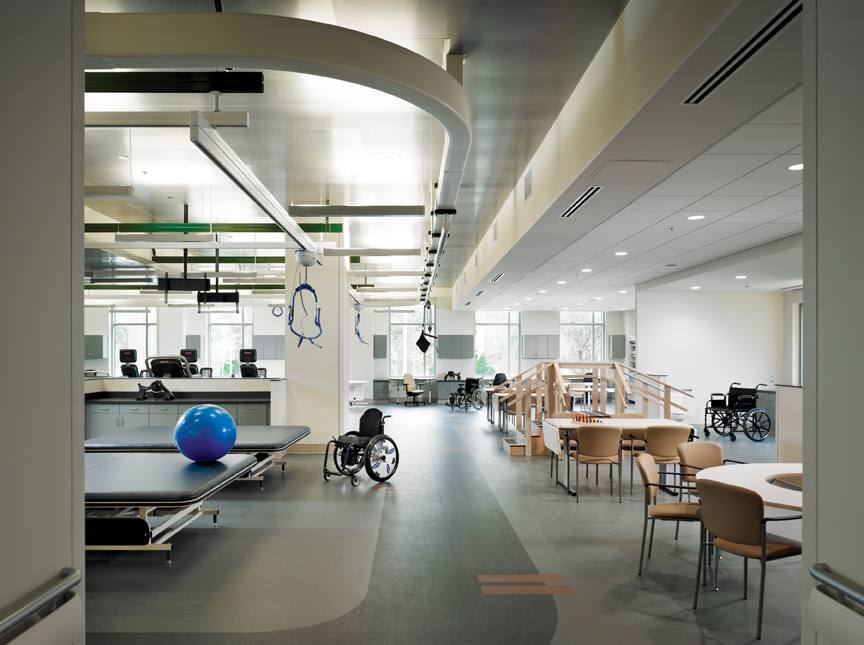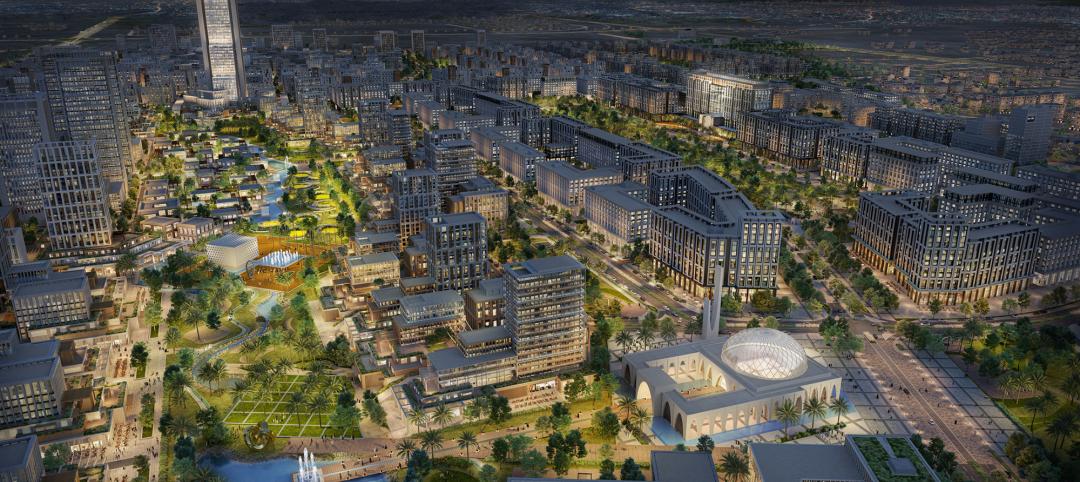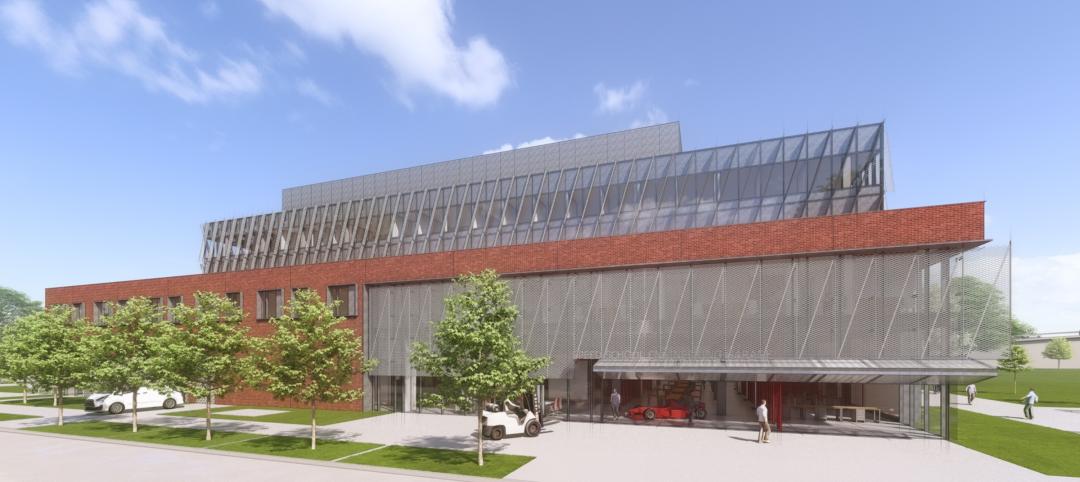2012 Building Team Awards
Gold Award
Since the early 2000s, the U.S. Department of Veterans Affairs has treated more than 200,000 Iraq- and Afghanistan-war veterans for post-traumatic stress disorder. The rate of traumatic brain injury (TBI) among U.S. forces has risen dramatically in the last decade as well, from 10,963 cases in all of 2000 to 30,380 just in the fourth quarter of 2011.
Audie L. Murphy VA Hospital in San Antonio, Texas, named after the most decorated soldier of World War II, provides a place for this dramatically increasing number of wounded veterans to receive care. The Building Team—prime contractor Robins & Morton and joint venture design firms SmithGroupJJR and Marmon Mok—faced complicated site logistics and security restrictions, but still managed to come in under budget and produce a facility that meets the physical and psychological needs of the veterans it serves.
This hospital was the VA’s first project constructed under the so-called “Integrated Design and Construct” method, which teams the contractor with the architect and owner early in the construction process. The Building Team credits this collaboration with the facility’s month-early completion and $3.75 million cost savings. Although the project was not required to be LEED-certified, the team still implemented high-level sustainability.
At the project’s core were the hospital’s patients: veterans recuperating from multiple traumatic injuries, often including limb loss and TBI. The “Planetree” principle—which seeks to create a healing environment inspired by nature—was employed throughout the facility’s design.
Because many TBI patients are extremely sensitive to light and noise, the Building Team used indirect and accent lighting and equipped each bed with controls so every patient can individually adjust the levels. All windows diffuse natural light and are equipped with blackout shades. Working with acoustic noise consultants, the team used low-pressure diffusers and air ducts to minimize the sound of air rushing through the HVAC system.
The Building Team went beyond standard ADA requirements and handicap-accessibility considerations to incorporate tools that help patients rehabilitate. The facility’s physical therapy gymnasium is used to work on remobilization in everyday scenarios, such as getting around the kitchen and bathroom and walking up and down stairs. Tracks for patient lift systems run along the ceilings throughout the facility to allow patients to walk while tethered, improving their balance, strength, and autonomy.
The GAIT Study room features a high-tech flooring system that measures the pressure points and angles with which a patient walks, runs, and jumps to assess whether correction is needed. The VA was also able to use a portion of the project’s $3.75 million cost savings to install a terrain park in the building’s center courtyard that functions as a physical therapy tool, with pull-up bars, steps, and paths of different surfaces.
“It’s one thing to say that you saved money, but to get a clear amenity out of it is a sign of a great Building Team,” said Tim Brown, AIA, of Tim Brown Architecture and associate professor at IIT’s College of Architecture, Chicago.
Hurdles posed by site logistics were handled quickly and efficiently. The laydown area and construction-employee parking lot were a full mile from the job site, requiring bussing workers to and from every day and night. Only one delivery truck could be on site at a time and every piece of material had to be scheduled in advance.
Project summary
GOLD AWARD
Audie L. Murphy VA Polytrauma Rehabilitation Center
San Antonio, TexasBuilding Team
Submitting entity: Robins & Morton (prime contractor)
Owner/developer: U.S. Department of Veterans Affairs
Architect: SmithGroupJJR | Marmon Mok Joint VentureGeneral Information
Project size: 84,000 sf
Construction cost: $39.5 million
Construction time: August 2009 to July 2011
Delivery method: Integrated design and construct
Phase one of the project included some work underneath the hospital’s existing parking lot, which meant that, for six weeks, Robins & Morton had to schedule work during nights and weekends to eliminate disruption to the hospital campus. Moreover, when the team tried to tie in the existing hospital to the new facility, it discovered that the 40-year-old building’s precast was falling down. The contractor had to remediate this problem while making sure that the new structure didn’t look like an add-on.
The Building Team’s commitment to veterans was paramount throughout the project. When, arguably for security reasons, the VA wanted to put up an Internet firewall, the team, knowing how important access to social media via laptops and mobile devices is to the new generation of veterans, fought for and got access to the Web for patients.
Robins & Morton also exceeded its goals for construction subcontracts granted to small veteran-owned businesses, awarding 17% to them. It also granted 10% to service-disabled veteran-owned small businesses, 6% to small disadvantaged businesses, 5% to women-owned small businesses, 41% to small business enterprises and 21% to HubZone small business.
Building Team Awards judge Terry Fielden, LEED AP BD+C, director of K-12 Education at International Contractors Inc., said he was impressed with the way the design came to fruition: “There was a lot of collaboration, especially with the veterans’ needs in mind.” BD+C
--
Click here to view exclusive video interviews of the 2012 Building Team Awards judges explaining their selection.
Related Stories
MFPRO+ News | Jul 22, 2024
6 multifamily WAFX 2024 Prize winners
Over 30 projects tackling global challenges such as climate change, public health, and social inequality have been named winners of the World Architecture Festival’s WAFX Awards.
Office Buildings | Jul 22, 2024
U.S. commercial foreclosures increased 48% in June from last year
The commercial building sector continues to be under financial pressure as foreclosures nationwide increased 48% in June compared to June 2023, according to ATTOM, a real estate data analysis firm.
Codes and Standards | Jul 22, 2024
Tennessee developers can now hire their own building safety inspectors
A new law in Tennessee allows developers to hire their own building inspectors to check for environmental, safety, and construction violations. The law is intended to streamline the building process, particularly in rapidly growing communities.
Codes and Standards | Jul 22, 2024
New FEMA rules include climate change impacts
FEMA’s new rules governing rebuilding after disasters will take into account the impacts of climate change on future flood risk. For decades, the agency has followed a 100-year floodplain standard—an area that has a 1% chance of flooding in a given year.
Construction Costs | Jul 18, 2024
Data center construction costs for 2024
Gordian’s data features more than 100 building models, including computer data centers. These localized models allow architects, engineers, and other preconstruction professionals to quickly and accurately create conceptual estimates for future builds. This table shows a five-year view of costs per square foot for one-story computer data centers.
Sustainability | Jul 18, 2024
Grimshaw launches free online tool to help accelerate decarbonization of buildings
Minoro, an online platform to help accelerate the decarbonization of buildings, was recently launched by architecture firm Grimshaw, in collaboration with more than 20 supporting organizations including World Business Council for Sustainable Development (WBCSD), RIBA, Architecture 2030, the World Green Building Council (WorldGBC) and several national Green Building Councils from across the globe.
University Buildings | Jul 17, 2024
University of Louisville Student Success Building will be new heart of engineering program
A new Student Success Building will serve as the heart of the newly designed University of Louisville’s J.B. Speed School of Engineering. The 115,000-sf structure will greatly increase lab space and consolidate student services to one location.
Healthcare Facilities | Jul 16, 2024
Watch on-demand: Key Trends in the Healthcare Facilities Market for 2024-2025
Join the Building Design+Construction editorial team for this on-demand webinar on key trends, innovations, and opportunities in the $65 billion U.S. healthcare buildings market. A panel of healthcare design and construction experts present their latest projects, trends, innovations, opportunities, and data/research on key healthcare facilities sub-sectors. A 2024-2025 U.S. healthcare facilities market outlook is also presented.
K-12 Schools | Jul 15, 2024
A Cleveland suburb opens a $31.7 million new middle school and renovated high school
Accommodating 1,283 students in grades 6-12, the Warrensville, Ohio school complex features flexible learning environments and offers programs ranging from culinary arts and firefighting training to e-sports.
MFPRO+ News | Jul 15, 2024
More permits for ADUs than single-family homes issued in San Diego
Popularity of granny flats growing in California

















